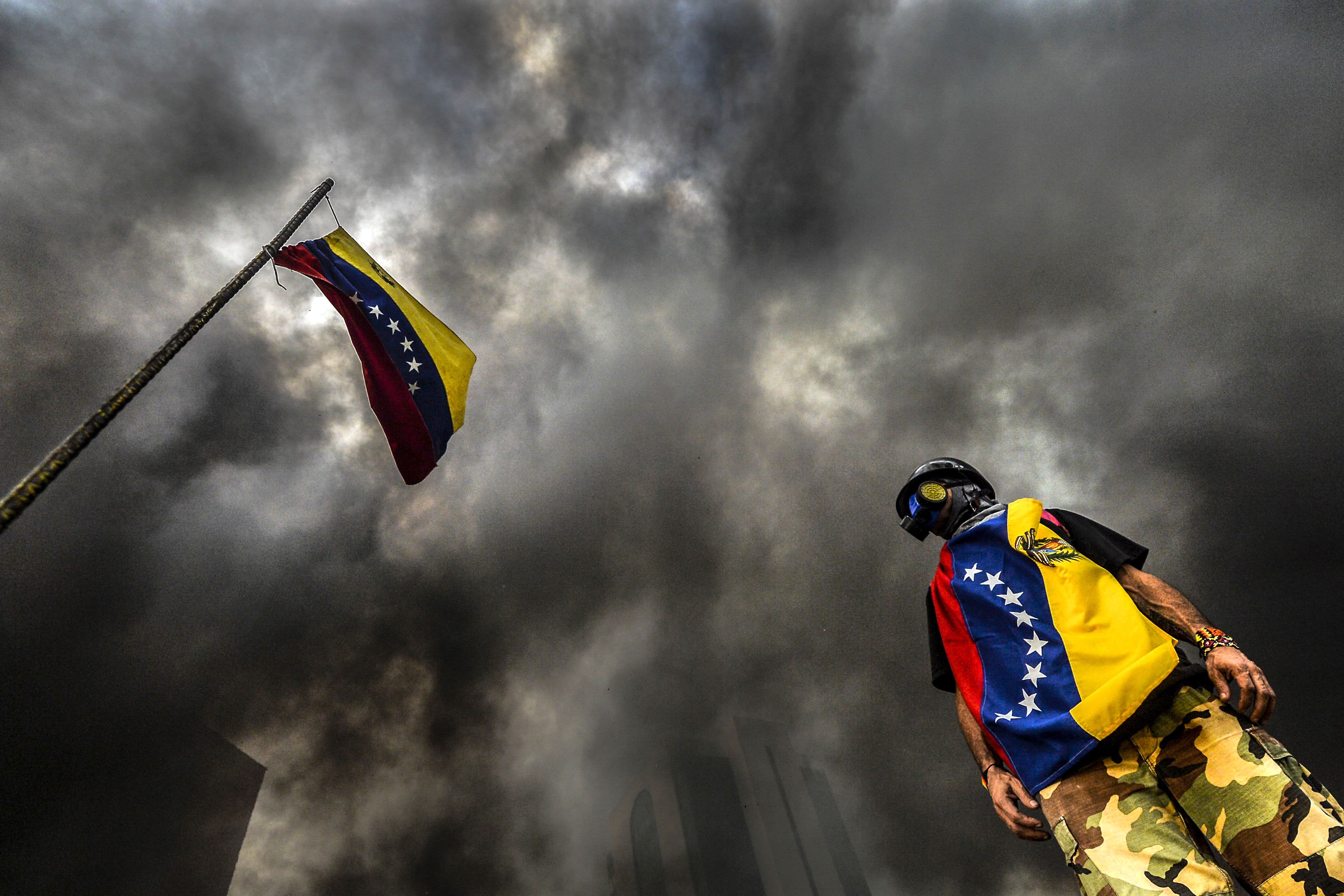Here’s how the US-Venezuela relationship reached a boiling point

[ad_1]
A protester waves a Venezuelan flag during ongoing protests against the government of Venezuelan President Nicolas Maduro in Caracas, on May 27, 2017.
Anadolu Agency | Anadolu Agency | Getty Images
WASHINGTON — Amid a collapsing economy sparked by government corruption, social unrest and a global commodity bust, the oil-rich nation of Venezuela faces even more uncertainty as the Trump administration reaffirmed its decision to back opposition leader Juan Guaido over President Nicolas Maduro.
Guaido, who declared himself interim president in January, said Tuesday he was “beginning the final phase of Operation Freedom” and promised to bring an end to Maduro’s government. In the wake of his address, opposition protesters clashed in Caracas with Venezuelan soldiers.
President Donald Trump, who was briefed Tuesday on the situation in Venezuela, wrote on Twitter that he stands with the “people of Venezuela and their freedom.”
Echoing Trump’s sentiments, acting Secretary of Defense Patrick Shanahan also wrote on Twitter: “The U.S. Government stands in support of interim Venezuelan President Juan Guaido and the people of Venezuela in their quest for freedom and democracy as they take back their country with #OperacionLibertad”
National security advisor John Bolton added to the pressure.
“It’s still very important for key figures in the regime, who have been talking to the opposition over these last three months, to make good on their commitments to achieve a peaceful transfer of power from [Maduro] to interim President Juan Guaido,” Bolton told reporters at the White House on Tuesday.
White House National Security Advisor John Bolton talks to reporters outside of the White House West Wing April 30, 2019 in Washington, DC.
Chip Somodevilla | Getty Images
These fast-moving developments have brought U.S.-Venezuelan relations to a boiling point after a nearly two-decade saga.
Tensions between Venezuela and the U.S. can be traced back to when Hugo Chavez, Maduro’s predecessor, first became president of Venezuela in 1999. During his campaign for president, Chavez villainized the U.S. and other countries he felt were taking advantage of Venezuela.
“It resonated with the voters at the time because Venezuela had a growth collapse in the 1980s, right after oil prices started to fall around the world. It never quite recovered from that,” said Monica de Bolle, senior fellow at the Peterson Institute for International Economics. “By the time Chavez came to power, people were just sick of it. They just wanted some big change to happen.”
Hugo Chavez wins election.
Juan Barreto | AFP | Getty Images
Venezuela’s economy is tightly tied to oil, its biggest export. The South American nation has the biggest oil reserves in the world. In 2017, Venezuela’s oil reserves totaled 302.81 billion barrels, according to data from OPEC.
While crude prices trended lower in the 1980s and 1990s, they recovered sharply right before the turn of the century, giving the Chavez government a massive windfall to put in motion several reforms like free health care. The spike in crude also gave Chavez the capital he needed to try and undercut U.S. influence in Latin America.
In 2004, Venezuela and Cuba created an economic pact called the Bolivarian Alliance for the Peoples of Our America. In 2005, Chavez founded Petrocaribe, a group of countries that lets members purchase oil from Venezuela at a lower price.
Chavez also accused the U.S. of aiding in an attempted coup against his government back in 2002. While the Bush administration tried to distance itself from the coup attempt, documents found in 2004 showed the CIA knew of an attempted coup back then.
The U.S. has also condemned Venezuela for imprisoning political opponents as well as the Chavez regime’s consolidation of power. Chavez seized control of the country’s supreme court in 2004. He also increased his control over the local media, passing laws that penalized outlets for running content that “offends” public officials.
A difficult bond over oil
But relations between the U.S. and Venezuela remained close as the U.S. is still a big consumer of Venezuelan oil. U.S. imports of Venezuelan crude oil and petroleum products averaged nearly 600,000 barrels per day in the first 10 months of last year, according to the U.S. Energy Information Administration.
Once Chavez died in 2013 and Maduro took over, tensions began to increase once again. Maduro, who is not the charismatic leader Chavez was, consolidated his power in 2017 by stripping the country’s opposition-led legislature of power. By then, a massive humanitarian and economic crisis had already begun.
Venezuela’s economy was decimated after oil prices began collapsing in late 2014. The fall in oil prices made it hard for Venezuela to keep providing subsidies for its many national programs. It has also led to a massive shortage of food and other basic goods like medicine.
This crisis has led the Trump administration to slap sanctions on dozens of Venezuelans associated with the Maduro regime, including his wife, Cilia Flores.
“The situation has deteriorated to the point where there are all kinds of crises in Venezuela,” said Peterson’s de Bolle. “You have a massive economic crisis, you have a massive institutional crisis, you have a massive migration crisis, you have a massive humanitarian crisis. It’s all bad.”
Russia ups the ante in Venezuela
Russia’s President Vladimir Putin and his Venezuelan counterpart Nicolas Maduro shake hands during a ceremony at the Kremlin in Moscow, on July 2, 2013.
Maxim Shemetov | AFP | Getty Images
Through all of this, Venezuela has found a natural ally in Russia.
Moscow is not only a major political friend of Caracas but also a financier of the South American nation’s oil fields. Russia’s largest oil company, Rosneft, operates in Venezuela and has issued loans to the state-run oil company PDVSA.
In another show of support, Moscow has given Caracas a line of credit to purchase Russian arms. From Kalashnikov rifles to Sukhoi planes, the Kremlin has brokered several weapons deals with Venezuela and recently deployed two Russian bombers to the country.
Last month, two Russian Tu-160 strategic bombers, capable of carrying nuclear weapons, landed in Caracas in a move designed to show Moscow’s support of Venezuela’s socialist regime. Despite the nation’s economic crisis, Maduro welcomed the deployment of the Russian aircraft.
A Tupolev Tu-160M heavy strategic bomber performs a demonstration flight at an airfield of the Gorbunov Kazan Aviation Factory.
Marina Lystseva | TASS via Getty Images
The Pentagon swiftly criticized the Russian deployment of warplanes to Venezuela.
“The Venezuelan government should be focusing on providing humanitarian assistance and aid to lessen the suffering of its people and not on Russian warplanes,” Pentagon spokesman U.S. Army Col. Rob Manning said at the time of the deployment.
Similarly, Secretary of State Mike Pompeo condemned the Russian military flight on Twitter: “The Russian and Venezuelan people should see this for what it is: two corrupt governments squandering public funds, and squelching liberty and freedom while their people suffer.”
Meanwhile, the Kremlin rejected U.S. criticism, saying Pompeo was wrong and undiplomatic to condemn the deployment to Caracas.
“We consider it completely inappropriate,” Kremlin spokesman Dmitry Peskov said in response. The Pentagon’s Manning then reminded the world that the U.S. military deployed the hospital ship USNS Comfort to South America late last year to provide humanitarian aid to refugees fleeing the desperate conditions.
Since its deployment this summer, the Comfort, a vessel transformed from a hulking oil tanker into a 1,000-bed hospital ship, has treated more than 20,000 people along its stops in various Central and South American nations.
“Contrast this with Russia, whose approach to the man-made disaster in Venezuela is to send bomber aircraft instead of humanitarian assistance,” Manning said, knocking Moscow’s deployment.
Source link






